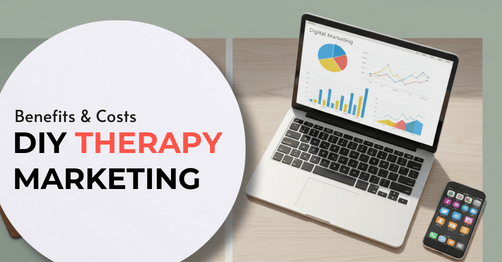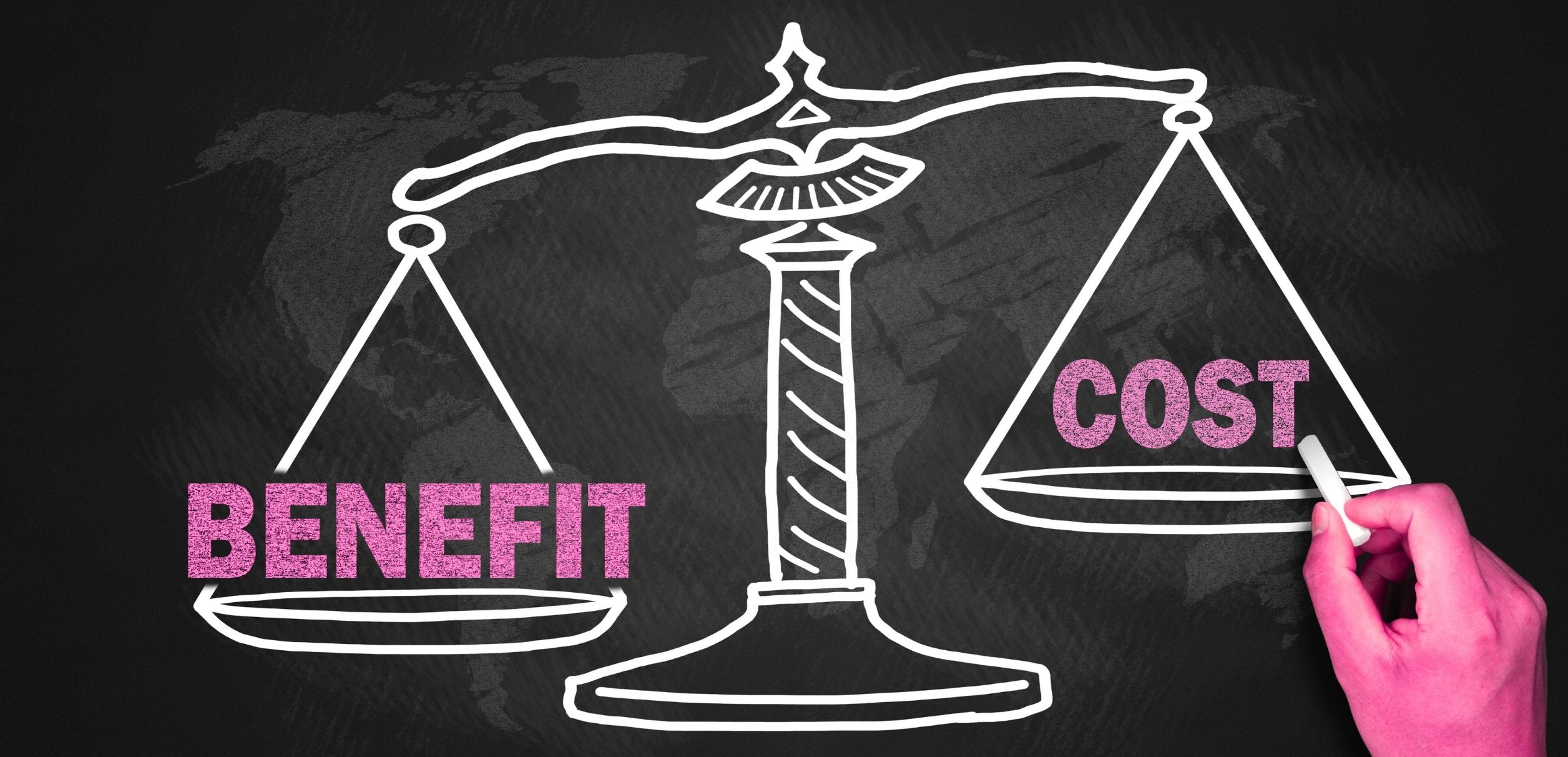Learning how to market a therapy workshop on social media is essential for therapists, counselors, and mental health professionals. This guide walks you through proven strategies for promoting your online and in-person CE and professional development workshops. We’ll review how to optimize your social posts for reach, using platform-specific event tools, repurposing existing content, collaborating with your professional network, and extending your promotion beyond social media. Build credibility, reach the right audience, and increase workshop registrations.
Table of Contents
- The Factors That Affect Therapy Workshop Promotion on Social Media
- Optimizing Your Social Media Posts for Reach and Legibility
- Using Adjacent Content to Drive Interest
- Testing Your Content Before Launching Paid Events
- Using Social Media’s In-App Features
- Tapping Into Your Professional Community
- Cross-Channel Promotion: Leverage Your Entire Online Presence
“No one’s signing up for my workshop.” If you’ve ever found yourself saying this, you’re not alone. Many therapists, counselors, and mental health professionals struggle to get traction when promoting professional development or continuing education (CE) workshops online. It’s not that your topic isn’t valuable; it’s that your social media content isn’t optimized for the hyper-competitive online landscape of today. Let’s explain.
The Factors That Affect Therapy Workshop Promotion on Social Media
A successful promotion of your therapy workshop on social media depends on four areas:
- Post Format and Structure: The structure, clarity, and design of your posts and the accompanying visual design or video make the difference between a scroll-past and a registration.
- The Robustness of Existing Content: You’ll need to lean into any existing material you have that can showcase your domain expertise and modality.
- Event-based Features: Facebook, Instagram, and LinkedIn offer event tools that can expand your reach. So be sure to take advantage of them where you can.
- Online Community: Your professional network and colleagues can amplify your reach when you involve them in your event promotion (if they’re willing).
Optimizing Your Social Media Posts for Reach and Legibility
Every post you publish on social media is a preview of your workshop that should communicate the essentials and make it easy to take the next step.
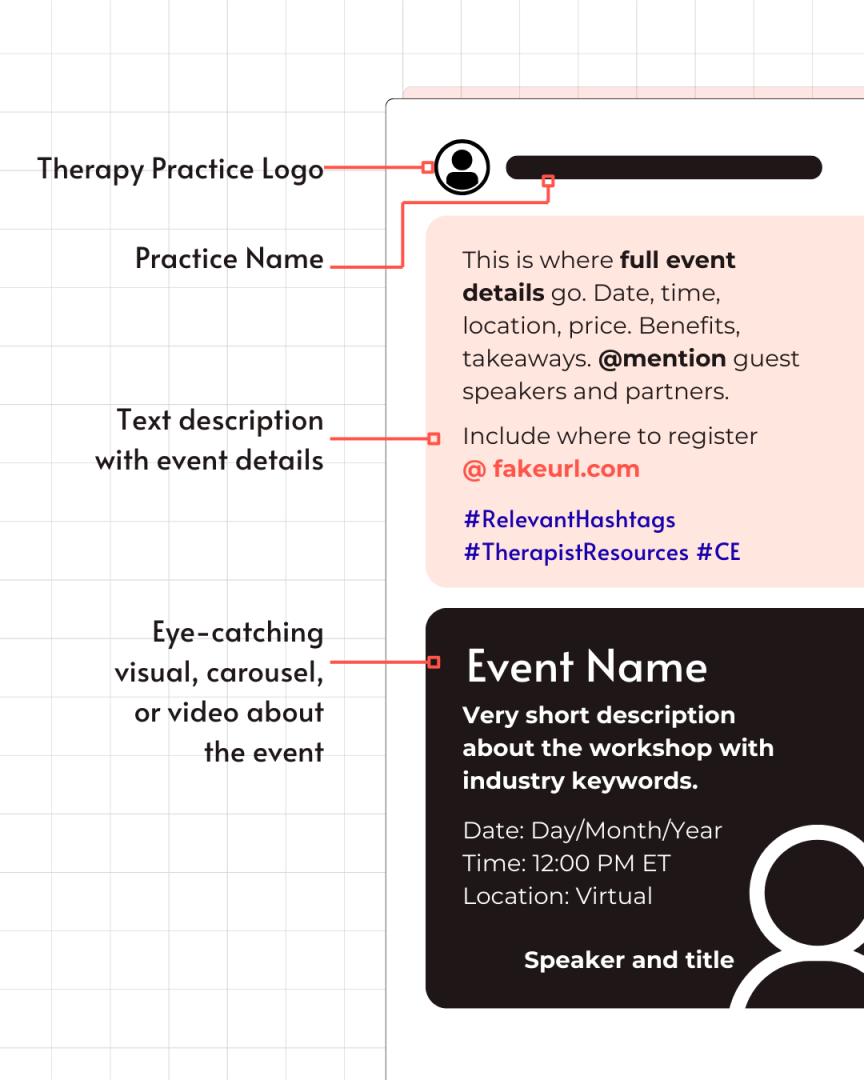
The Text Description
- Add expanded details: price, date, time, location (virtual or in-person), CE credits offered, and a concise description of the workshop.
- Include @mentions of event speakers or @companyaccounts of partners.
- Always include a direct link to your registration page. The link should go straight to a landing page where visitors can learn all workshop details, value, and register. Sending people to a homepage or asking them to take an additional step, like going to a profile page, is likely to result in a drop-off.
- Your landing page should:
- Contain all the necessary details without clutter.
- Highlight the benefits and outcomes (“walk away with a completed exercise you can apply with clients”).
- Include a simple, frictionless registration and payment experience.
- Clearly state what attendees can expect during and after the workshop. There’s no such thing as “giving too much away for free” when your goal is to build trust and remove uncertainty.
The Image or Video
- Stay consistent with your professional branding.
- Avoid overly bright or distracting colors.
- Make sure text is legible (minimum 27pt font).
- Include only the essential event details:
- Event name and short description.
- Date and time (with time zone, e.g., “EST”).
- Location (just “virtual” or “in-person”).
- Speaker thumbnail with name and brief credentials.
- Ensure design is eye-catching yet simple.
Frequency and Scheduling
Promote your workshop regularly before and after the event. A content calendar and scheduling tool can help here. Whether you use advanced tools like Buffer, Sprout Social, or Hootsuite, or even a simple Excel sheet, mapping out posts in advance avoids last-minute stress.
Using Adjacent Content to Drive Interest
If you’re struggling to fill seats, chances are you need to generate demand for the workshop and the subject. You can do this by repurposing existing content into “teaser” formats:
- Share clips from podcasts, past guest lectures, or recorded presentations that tie into your upcoming workshop topic. Add a call to action in both the video and description that directs viewers to your event registration landing page.
- If you’ve published a book or article, pull relevant case studies, excerpts, resource materials, or testimonials to demonstrate your credibility and expertise.
Adjacent content works because it provides proof of your domain expertise and builds anticipation for what participants will gain during your workshop.
Case Study: How GrowthSpurt Strategies helped drama therapist Diana J. Feldman grow her brand, Dramasol, through a content approach using her newly published book. Read how we did it.
Testing Your Content Before Launching Paid Events
Inviting someone to your therapy workshop is a big ask. You’re essentially asking someone to give up their time (ranging from 30 minutes to a full day) and, in most cases, their money.
If you don’t yet have evidence of demand for your workshop content, then start small:
- Test your workshop material for free and as accessible resources across your social media, website, and off-site materials to gauge your audience’s level of interest.
- Once you figure out interest, give more and test to see what content formats and topics are substantial enough to convince someone to give you their contact information.
- Finally, test your successfully gated content with a paywall to see what content offers are substantial enough to charge for.
For CE workshops specifically, your pricing should align with similar workshops in your field, and take care to understand your state’s CE and licensing requirements. Here is an example of New York State CE requirements for licensed mental health counselors.
More articles on developing great content and therapy marketing!
- Marketing a Therapy Private Practice
- The Anatomy of an Algorithm-Optimized Social Media Post
- Why Content Marketing Matters
Using Social Media’s In-App Features
Commonly used social media platforms like LinkedIn, Facebook, and Instagram offer event-specific tools to help you promote your therapy workshop.
- LinkedIn: Create an external event so users are directed to your registration platform (Eventbrite, Zoom, Webex, etc.). Check out LinkedIn’s Event Help Guide.
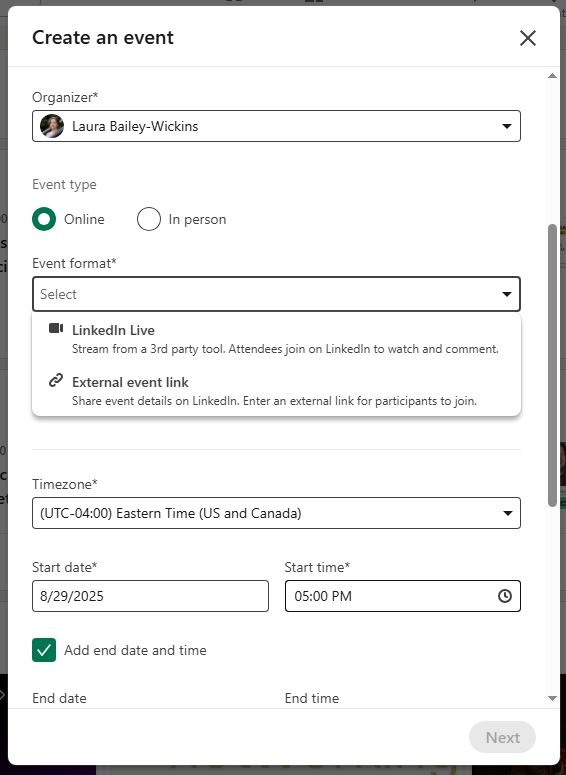
- Facebook: List your event in Facebook’s searchable events section to expand reach. Watch Meta’s Event Creation Video Guide.
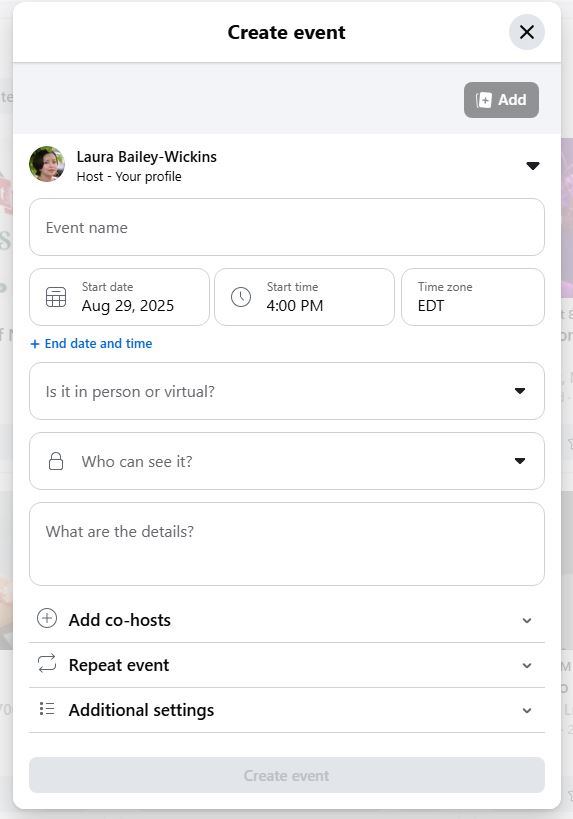
- Instagram: Add event reminders directly to your promotional posts. This allows followers to opt into notifications when your event goes live. Read how to Create an Instagram Reminder when posting.
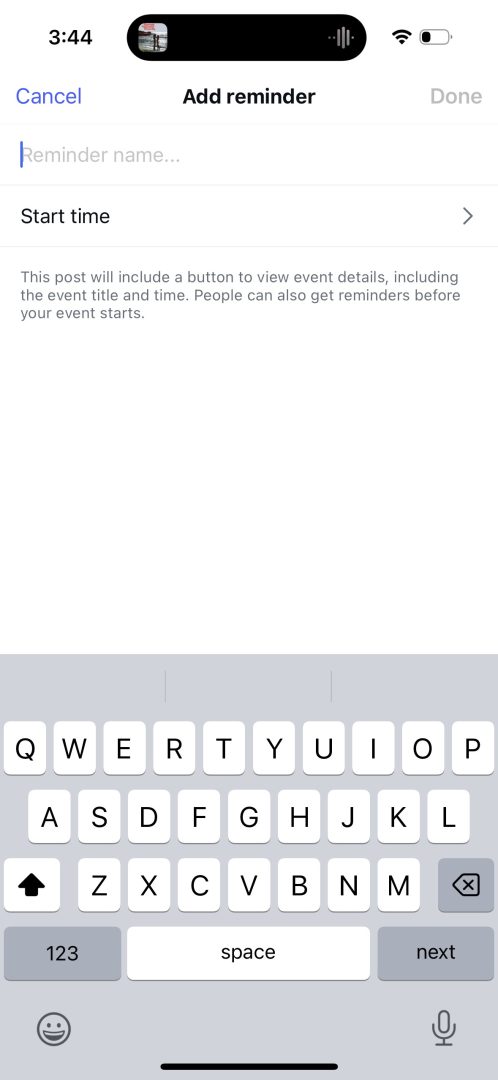
The event features in your app can reach a broader audience than your followers based on your subject, location, and keywords used.
Tapping Into Your Professional Community
Your colleagues and peers can be some of your most effective promoters if you involve them in the process and they’re willing to help.
- Ask Colleagues for Support: Request that friends, peers, or mentors reshare or comment on your event posts to expand reach to their follower base.
- Collaborate on Partner Content: Partner with colleagues who have an active presence on social media to create co-branded materials or reels that drive people to your workshop registration page.
- Attend and Observe Other Events: Participate in other professionals’ workshops to understand their workflow, webinar tools, and marketing support. By doing this, you’ll better understand what works and what to avoid in the case of promoting a workshop. Eventually, you’ll develop your own SOPs for events.
- Engage with Facebook Groups: There are many online therapy communities, particularly on Facebook, that exist for professional development and CE opportunities. Share your event, but remember, if you only post sales-driven content, you may get flagged as spam. Always prioritize being helpful and informative.
Cross-Channel Promotion: Leverage Your Entire Online Presence
Social media is one of many helpful promotion tools at your disposal. The best workshop registration results come from a cross-channel promotion approach:
- Email: Send direct invitations to colleagues and contacts.
- Paid Ads: Run targeted campaigns with adjacent therapy practices or professional networks. Be sure you know what keywords to bid for and successful copy to work with.
- Offline & Print Material: Distribute flyers, cards, or other print materials at relevant professional networking or classroom spaces.
- Website: Maintain a dedicated events page showcasing all upcoming workshops and webinars.
Try to give yourself at least 2–3 months of lead time to plan content, coordinate with collaborators, and secure promotion slots.
Let’s Promote Your Upcoming Workshop
Promoting your therapy workshop on social media doesn’t have to feel like shouting into the void. By optimizing your posts, leveraging adjacent content, using in-app features, tapping into your community, and promoting across multiple channels, you can create a steady flow of registrations and ensure your expertise reaches the right audience.
Schedule a free 30-minute consultation with us at GrowthSpurt Strategies. We’ll review your current engagement, website flow, and marketing strategy, then share personalized recommendations to help you maximize reach and attendance.


